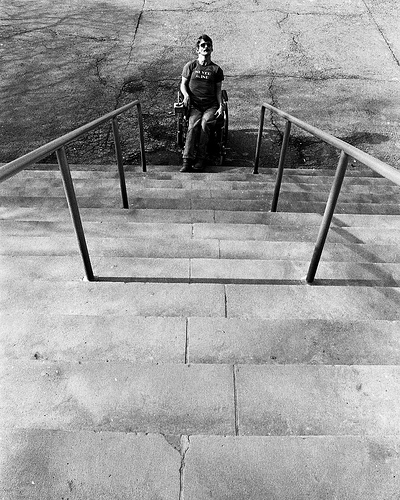


Statecollege.com columnist Patty Kleban’s March 15 article, “Americans with Disabilities Act Kicks Into High Gear,” was one of many fine essays lost amid the last-minute news that hotels would receive a 60-day extension to bring pools into compliance with the new ADA accessibility regulations.
For accessibility advocates like Kleban, who is also an instructor at Penn State, what is especially exciting about the updated ADA standards that were passed in 2009 and went into effect last week is that they provide the Department of Justice (DOJ) a greater ability to enforce the rules of compliance. Now entities that are dragging their heels on making the necessary accommodations for people with disabilities can be approached thusly:
The Access Board of the Department of Justice will no longer just wait for someone to file a complaint if it can’t get in your door or one of your employees says, ‘We can’t help you.’ The DOJ will begin enforcement and fines through random access audits and customer complaints when your business or service is inaccessible.
Swimming pool access is one of the new standards Kleban singles out at the close of her essay. But, as we now know, hotels may get an additional six months as the DOJ works out conflicting information about whether temporary lifts achieve an acceptable level of accessibility.
The hotel pool exception notwithstanding, Kleban characterized the rule change as the next phase toward achieving civil rights for people with disabilities — a natural progression from the Rehabilitation Act of 1973 that has made public spaces and programs accessible.
Kleban paid particular attention to the non-physical aspects of laws governing accessibility throughout her essay, focusing on efforts toward inclusion of people with disabilities instead. She recalled her own experience volunteering for a bowling program in the wake of the Rehab Act, which while an improvement over the complete lack of opportunity for people with disabilities, still didn’t seem to sit quite right with her and other participants:
The message seemed to be that if you had a disability… [T]his was where you should bowl. Participate with your friends or family in a regular program? Not so much. What if we decided that everything you do including school, work, going to the gym, vacationing, etc. had to be done with other people who can’t do something too?
Kleban then jumps ahead the passage of the ADA, a law intended to bring the same “barrier-free environment” to private entities that the Rehab Act opened in federally funded spaces. Again, she made sure to note that the definition of accessibility applies to social and intellectual elements as well as the physical, listing how the changes affected not only building and facilities but “what happens in those buildings and facilities.”
It is an important point to emphasize as I daresay most people think restrooms and parking spaces when hearing about equal accessibility, rather than training programs for people with disabilities or recreational opportunities that include everyone. Hopefully, it is not a part of the ADA that will require similar enforcement measures as some of the physical barriers that require remediation.
Comments?
Image by Elessar (Mike King), used under its Creative Commons license.
That’s an expert answer to an interesting question
This Free Spotify Premium Hack Apk is amazing. Now I can listen to all my favorite music without paying for a subscription!